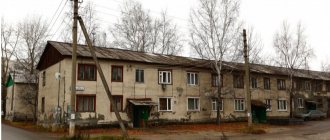For many people there is a problem with registration. Despite the existence of the right to freedom of movement in the Russian Federation, this legal institution has not been abolished; it is required when applying for loans, and is often necessary for getting a job. In addition, having a residence permit allows you to have the right to stay in housing, and in the case of emergency housing, the right to receive a similar area in the event of resettlement. Therefore, almost everyone who lives in dilapidated or worn-out housing is concerned with the question: is it possible to register in a dilapidated house.
When can a citizen be refused registration at his place of residence?
First of all, it should be noted that there is no direct prohibition in the current regulations on registration in emergency housing, so many lawyers take up challenging the actions or inactions of municipal authorities regarding registration. They justify their legal position by the fact that, according to the law ensuring the right of citizens of the Russian Federation to freedom of movement, it can be limited only in the following cases:
- When living near the border;
- The citizen is located in a closed territorial entity or military camp;
- In places where an environmental disaster occurred;
- In territories where a state of emergency or martial law has been introduced, as well as in places with special living conditions.
Since this law does not provide for restrictions prohibiting registration in emergency housing, a person who is in it legally (under a social tenancy agreement or by right of ownership) can be registered in it. However, in practice there are certain difficulties in this process. In particular, if the condition of the house is recognized as emergency, and it is included in the list of houses whose residents will be resettled, then after this fact it will be impossible to register in it.
What kind of housing can be considered unsafe?
The procedure and grounds for recognizing a house as unsafe are contained in the Housing Code of the Russian Federation, as well as individual government decrees that decipher the provisions of the Housing Code of the Russian Federation. In particular, it sets out the criteria by which a house can be recognized as unsafe. If the building is recognized as unsafe in accordance with the housing law, it will need to be demolished, and residents will be given the right to receive another apartment in exchange for the unsafe housing.
A house or individual apartments in it may be declared unsuitable and dangerous for living based on the results of an inspection by a special commission. In order for the commission to begin its work, it is necessary to draw up a special application, so the question of the owners of emergency premises, how to draw up this application, is very relevant. A sample document can be found on specialized websites.
When inspecting a house, experts pay attention to the following points: the level of wear and tear of the premises in general, and especially its foundation and floors. As a result, the commission recognizes the house as unsafe, and its residents receive the right to be provided with an apartment if the following signs are present:
- The area where the house is located is considered life-threatening;
- The building is deformed and has significant damage, including as a result of accidents or natural disasters;
- There is increased noise or a constant unpleasant odor in the premises, as a result of which it is impossible to stay there for a long time.
After the premises are recognized as unsafe, the owners have the right to receive a new apartment for their place of stay and residence within the same city or locality.
The Supreme Court found it impossible to remove the house from the targeted program for relocation from dilapidated housing
In Ruling No. 48-CAD20-12-K7 dated January 27, the Supreme Court examined whether it is possible to withdraw an apartment from the regional targeted program and refuse to provide housing in place of emergency housing.
Zoya Osolodkova is the only heir of her mother, who, until her death on May 5, 2007, was the owner of an apartment in an apartment building.
Based on the conclusion of the interdepartmental commission recognizing the residential building as unsafe and subject to demolition and the inspection report of the apartment building dated December 7, 2011, the residential building was recognized as unsafe and subject to demolition. The property is included in the list of emergency apartment buildings located on the territory of the Plastovsky municipal district and included in the regional targeted program “Resettlement of citizens from emergency housing stock in cities and districts of the Chelyabinsk region in 2013–2017.” By decree of the administration of the municipal district, the house was included in the municipal program “Resettlement in 2015 of citizens from emergency housing stock in the territory of the Plastovsky municipal district.”
On December 30, 2021, the district administration decided to seize residential premises in connection with the seizure of a land plot under an apartment building. Zoya Osolodkova was denied the provision of residential premises to replace the seized emergency housing, since the administration did not have legal grounds for this. Moreover, according to the certificate of the right to inheritance by law, the woman is the owner of this apartment, which is also confirmed by an extract from the Unified State Register of Real Estate.
Having considered that after the death of her mother she is the heir of the first stage and from the date of opening of the inheritance she has the property rights and obligations of the testator, who should be provided with housing instead of the emergency one in accordance with the list of residents, Zoya Osolodkova filed a claim with the Plastovsky City Court against the district administration for recognition refusal is illegal.
Satisfying the demands of the administrative plaintiff, the court of first instance proceeded from the fact that the apartment building in which the residential premises are located was recognized as unsafe, was included in the relevant municipal and regional resettlement programs, and was actually seized from the owners, referring to the special nature of the rules of law contained in the Law on The Fund for Assistance to the Reform of Housing and Communal Services (in relation to the provisions of Article 32 of the Housing Code), came to the conclusion that the applicant, at his choice, has the right to demand the purchase of residential premises or the provision of another residential premises as a property.
The appellate court, citing the provisions of Part 8 of Art. 32 of the Housing Code, pointed out the absence of an agreement concluded with the administrative plaintiff, as well as the administration’s decision to seize the apartment belonging to Zoya Osolodkova, and her statement about choosing a way to ensure her housing rights during the period of the regional targeted program for the resettlement of citizens. The court came to the conclusion that it was possible to protect the rights of Zoya Osolodkova exclusively in the general manner provided for by the Housing Code, and, therefore, the legality of the contested decision of the municipal authority. The Judicial Collegium for Administrative Cases of the Seventh Court of Cassation of General Jurisdiction agreed with the conclusions of the appeal.
Having considered the complaint of Zoya Osolodkova, the Supreme Court noted that the conclusion of the appeal and cassation that the woman, due to the lack of an agreement on the seizure of the disputed apartment, does not have the right to be provided with another residential premises in place of the housing recognized as unsafe, is erroneous, since the land plot, on where the specified house is located, was seized in accordance with Parts 1, 2 of Art. 32 of the Housing Code.
In addition, the Supreme Court drew attention to the fact that the object of the regional targeted program is the housing stock as a set of residential premises of apartment buildings recognized in accordance with the established procedure as unsafe and subject to demolition and resettlement, the administrative defendant had no right to arbitrarily remove an apartment belonging to on the right of ownership to the applicant.
At the same time, the Court pointed out, Zoya Osolodkova chose the method of ensuring her housing rights, provided for by the Law on the Fund for Assistance to the Reform of Housing and Communal Services and operating as part of the implementation of a regional targeted program, - the provision of another residential premises to replace the housing recognized as unsafe. The Supreme Court noted that at the time the plaintiff filed a statement with the administration, she was deprived of the opportunity to live in the apartment, since the house was partially destroyed. This indicates that the residential premises have actually been taken away from the property.
“Taking into account the above, the refusal of the administration of the Plastovsky municipal district of the Chelyabinsk region to provide the applicant with residential premises in exchange for the actually seized emergency housing cannot be considered legal,” the Supreme Court concluded, upholding the decision of the first instance.
Lawyer of the Moscow AP Anna Minushkina called the position of the Supreme Court correct, since the legislation, in case of inclusion of a house in a regional targeted program for relocation from emergency housing, provides for the provision of either other residential premises or its purchase. This choice is a person’s right – it is impossible to limit it in the options specified in the legislation.
The lawyer pointed out that the courts of the second and cassation instances did not take into account that the residential building was initially included in the regional targeted program for relocation from dilapidated housing. Later, the land plot on which the residential building was located was declared subject to seizure, and the house to demolition. Based on this decision, the courts determined that the general procedure provided for by the RF LC is applicable, and not the special one, as the court of first instance initially indicated.
“However, this does not seem to be correct. In fact, the Supreme Court of the Russian Federation in its definition indicated the applicable procedure in situations where there are grounds for two ways to exercise the housing rights of citizens when housing is recognized as unsafe. Thus, the Supreme Court indicated that in the presence of a regional targeted resettlement program, where the subject is the housing stock as a set of apartment buildings, it is not correct to single out a separate residential premises from this set, applying the general procedure to it,” concluded Anna Minushkina.
Arina Shmoilova, assistant lawyer at the Commonwealth of Land Lawyers, noted that the inclusion of MKD in the regional resettlement program is a key point in determining how to ensure the rights of residential property owners when relocating from dilapidated housing. If the apartment building is not included in such a program, then the provision of new residential premises may be rightfully refused. In this case, the owner will be provided with cash as compensation.
“In the case under consideration, the plaintiff acquired the right to an apartment by inheritance, while the apartment was already included in the regional program for the resettlement of citizens from emergency housing stock. Exercising his right to choose the method of compensation for seized housing, the plaintiff chose to provide other residential premises. The court of first instance rightfully satisfied the plaintiff’s demands to impose the obligation to provide residential premises on the district administration. This method of protecting housing rights is legal and legitimate, and is fully consistent with the established practice of the Supreme Court. The cassation and appellate instances, despite widespread practice, wrongfully overturned the decision of the first instance, depriving the plaintiff of the right to choose the method of ensuring the rights of owners, provided for in the Law on the Fund for Assistance to Reforming Housing and Communal Services,” the expert pointed out.
Arina Shmoilova noted that the Supreme Court overturned the rulings on appeal and cassation, once again pointing out the illegality of depriving owners of the right to choose the method of compensation. The decision of the court of first instance was upheld, which confirms the established practice of resolving disputes related to ensuring the housing rights of owners.
Features of registration
Registration in an emergency apartment is quite possible, but only until it is included in a special list of premises whose residents must be evicted. Relocation from emergency housing can take a long time, but from the moment the decision is made to include it in the specified list, it will be impossible to register the child there or register yourself. This is due to the fact that in some cases, unscrupulous citizens specifically buy apartments from residents of dilapidated buildings, so that they can then promptly register there and receive the right to a new apartment.
At the same time, it must be remembered that the condition of the premises is not a basis for refusal of registration. Both the owner of the apartment and his family members can obtain a residence permit. There are two options for obtaining registration. The first is for residents living in an apartment under a social tenancy agreement. They need to submit the following documents to the passport office:
- Confirmation that the person has moved out of the previously occupied premises;
- Application in the prescribed form;
- Passport or equivalent document;
- Receipt of payment of the duty to the budget;
- Confirmation of the existence of grounds for occupancy: certificate of ownership of the premises, consent of the owner and rental agreement for the apartment.
The second option is to register at your place of residence - if you own the premises. Registration in privatized housing requires the consent of all apartment owners. If such a document is available, then if there is confirmation of the right to the premises, the person must be registered in the apartment. However, it must be remembered that the privatization of dilapidated houses is a complex procedure and may not end in success.
✅ Under what conditions is registration possible?
Emergency housing stock has a special status. This includes homes with a damage percentage of 70% or higher. The peculiarity of emergency buildings is the degree of wear and tear - the destruction of load-bearing walls, roofs, foundations and other elements. Living in such houses is problematic, but people are often forced to wait for a reaction from the authorities. If the house is subject to demolition, the residents are moved to new apartments or paid the redemption price. Good options, but what if registration is really necessary?







